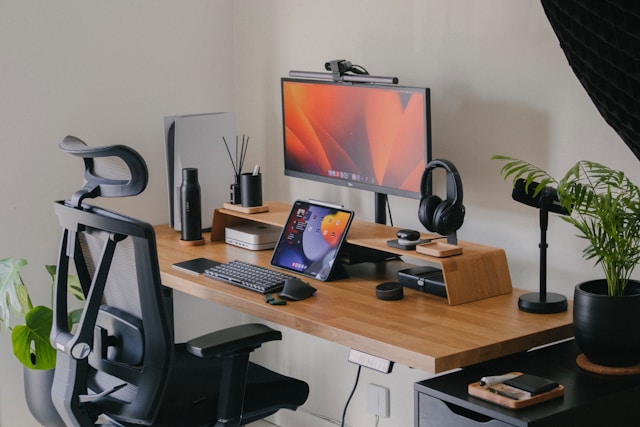Remote work is no longer a trend it’s a lifestyle. Whether you’re a full-time remote employee and freelancer, student, or side hustler, having a dedicated workspace at home is key to staying productive and focused. The good news? You don’t need to spend a fortune to create one. With a little creativity and planning, it’s entirely possible to design a stylish and functional home office on a budget.
In this guide, we’ll walk you through the essential steps and affordable home office ideas that will help you build the workspace you need without breaking the bank.
Step 1: Assess Your Space and Needs
Before you buy anything, take a moment to assess your space and how you’ll use it.
-
What kind of work will you be doing? Will you need video conferencing space, multiple monitors, or just a quiet spot for writing and emails?
-
How much space do you have? A spare room is great, but even a corner, closet, or hallway nook can be transformed into a productive zone.
-
List your must-haves vs. nice-to-haves. Focus on essentials first desk, chair, lighting then look at decorative or convenience upgrades later.
Identifying your goals upfront will help avoid unnecessary purchases and guide your setup decisions.
Step 2: Budget-Friendly Home Office Essentials
Creating a comfortable and effective workspace doesn’t require top-of-the-line furniture. You can build a great budget home office setup with a few well-chosen basics.
Desks and Work Surfaces
-
Use a repurposed dining table, folding table, or even a sturdy board placed on file cabinets.
-
Search for secondhand desks on Craigslist, Facebook Marketplace, or local thrift stores.
-
Try DIY desk projects using affordable materials from hardware stores or IKEA hacks.
Ergonomic and Affordable Chairs
-
A comfortable chair is crucial. Look for budget ergonomic chairs online or secondhand office chairs in good condition.
-
Even a regular chair can be improved with a lumbar cushion or a seat pad for added comfort.
Lighting on a Budget
-
If possible, place your setup near a window for natural light.
-
Use affordable LED desk lamps with adjustable brightness.
-
Add daylight bulbs to any existing lamps to reduce eye strain.
Tech Setup
-
A laptop stand improves posture and frees up desk space.
-
An external keyboard and mouse can often be found at low prices or bundled deals.
-
If you need a second screen, consider a budget monitor, or use a tablet as a second display.
Storage Solutions
-
Use stackable bins, wall-mounted shelves, or inexpensive carts to keep your space clutter-free.
-
Repurpose shoeboxes, mason jars, or baskets as organizers for supplies and cables.
These affordable home office ideas keep you focused on productivity, without overspending.
Step 3: Decor and Personal Touches That Don’t Cost a Lot
A functional space is important but a little style and personality can go a long way in making your office feel like your own.
Budget Decor Tips
-
Add greenery with low-maintenance plants like succulents or faux plants from discount stores.
-
Use removable wallpaper, posters, or framed prints to add color and character.
-
Light up the vibe with LED string lights or a cozy desk lamp.
Creative DIY Touches
-
Paint an old piece of furniture to match your office style.
-
Use corkboards, pegboards, or a vision board for a personalized wall display.
-
Look to platforms like Pinterest or YouTube for cheap home office furniture transformations and decor hacks.
Personalizing your home office doesn’t have to be expensive it just takes a bit of imagination and effort.
Step 4: Save Even More with Smart Shopping
Here are a few tips to help stretch your budget further:
-
Buy used or refurbished: Local marketplaces, eBay, and outlet stores often have high-quality items at a fraction of retail prices.
-
Shop sales: Back-to-school and end-of-season sales are great times to find discounted office supplies and furniture.
-
DIY when possible: From making a standing desk to building custom shelves, there are endless low-cost projects that can enhance your workspace.
-
Use what you already have: Reorganize and repurpose existing furniture and supplies before making new purchases.
A budget home office setup is about working smarter, not spending more.
Step 5: Avoid Common Mistakes
Even when spending less, it’s easy to make decisions that hinder comfort or efficiency. Watch out for these common pitfalls:
-
Overbuying gadgets or furniture you don’t really need.
-
Ignoring ergonomics, which can lead to physical discomfort over time.
-
Choosing style over function, like picking a pretty chair that lacks support.
-
Forgetting cable management, leading to clutter and distraction.
Plan carefully and focus on functionality first then you can add flair later.
Step 6: Final Touches to Boost Productivity
Once your basic setup is in place, add a few finishing touches to make your space even more efficient:
-
Noise-cancelling headphones or white noise machines can help block distractions.
-
Use a productivity timer app or Pomodoro timer to stay focused.
-
Set clear boundaries between work and home life especially important in a small space.
-
Consider creating a mini relaxation corner with a cozy chair, blanket, or scented candle to mentally disconnect when your workday ends.
Even in a small space, these small details can significantly improve your work-from-home experience.
Conclusion
Building a home office on a budget isn’t just possible it’s practical. With some smart planning, a bit of creativity, and the right mindset, you can create a space that supports focus, comfort, and productivity without draining your savings. Whether you’re outfitting a full room or carving out a quiet corner, these affordable home office ideas prove that great workspaces don’t require a big investment just thoughtful choices.

